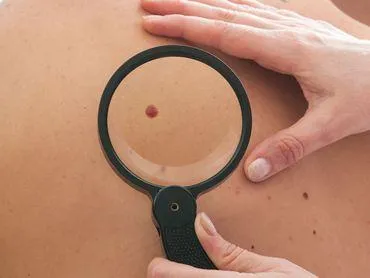Offering Free Skin Cancer Screening
Skin Cancer Treatment
- Emergency Appointments Available
- 40+ Years of Experience
- Insurance Accepted
Hours: Mon - Thu 8:00 am - 4:00 pm
Friday 8:00 am - 2:00 pm
Closed: Saturday - Sunday

State-of-the-Art Care for Skin Cancer
When your health is at risk, it's important to receive quality care from top practitioners using state-of-the-art treatments and technologies. At Bradenton Dermatology & Laser Center, our lead physician is Dr. Jack Jawitz. He has over 40 years of experience in treating skin cancer with the best practices available, such as Mohs surgery and superficial radiation, and he's board certified by the American Board of Dermatology.
When you visit us, we help you understand your condition and what our treatments include. We work with all major insurance companies, and we'll be glad to take care of the paperwork. Emergency appointments are available, so call Bradenton Dermatology & Laser Center today.

Experienced Care for Skin Cancer
Emergency appointments are available.
Call today to request an appointment.
The Basics of Skin Cancer
In the United States — and especially in Florida — skin cancer is becoming more prevalent. All that time under the sun on the beach or the water can lead to skin cancer. If it goes untreated, skin cancer can invade the surrounding tissues and metastasize into your bodily organs. It can ultimately prove fatal. Some studies show that an estimated 9,000 to 10,000 people die every year from it.
The best ways to prevent skin cancer from becoming deadly are to maintain awareness and catch it early. Self-examinations, regular checkups, and specialized care from a dermatologist can detect skin cancer in its early stages, and the good news is that it has very high cure rates when it's detected early.
At Bradenton Dermatology & Laser Center, we see and treat three types of skin cancer all the time.
Squamous cell carcinoma and basal cell carcinoma are similar in that they're rarely fatal when they're caught early, but they can lead to disfigurement because they have roots that extend into the surrounding tissues. If the roots aren't completely removed, the cancer cells are likely to develop new lesions and continue growing. Some patients need extensive surgery to repair the damage.
Melanoma is more dangerous. It has a very high mortality rate when it's left untreated or detected late. Even with early detection, it has a 2% mortality rate. You can see why early detection and swift treatment with the best techniques are so important.
At Bradenton Dermatology & Laser Center, the treatments we use most often are Mohs surgery and superficial radiation therapy. To learn more about these state-of-the-art skin cancer treatments, please keep reading.

This place is amazing. Casey is the sweetest person, and all the staff is great. I always feel awkward going to a new place, but Casey made me feel so welcome and like I had been going there my whole life. I am so thankful someone recommended this place to me. Now I have been telling everyone about them. Awesome job, Bradenton Dermatology. I appreciate everything you have done and making me feel like family!!
- Ashley G. on Google

Mohs Surgery
Mohs surgery is an effective procedure for treating skin cancer because it examines the entire perimeter of the growth and leads to more accurate evaluations. With better evaluations, it can cure skin cancer with rates as high as 98%.
Traditional skin cancer excisions remove a small amount of the tissue and send it to a pathologist. Unfortunately, this process only examines about 1% of the tumor's perimeter. If no cancer cells are seen in that tiny sample, it might be concluded that the rest of the perimeter is similarly clear.
When we use Mohs micrographic surgery, we remove the tumor and a minimal amount of surrounding skin. An analysis is done to see if cancer tentacles are present on the perimeter. If they are, our surgeon removes a little more tissue and analyzes it again. The process continues until we are unable to see any cancer cells in the tissue.
We look at the tissue all around and under the tumor, and we make a skin map so we know where we've located cancer tentacles. This technique leads to a more thorough diagnosis and better treatment results.
A certain amount of reconstructive surgery is necessary after removing the tissue and completing treatment. In most cases, reconstructive surgery is highly effective and nearly invisible after one or two years. For a deeper discussion of Mohs surgery and its potential outcomes in your case, call Bradenton Dermatology & Laser Center.
Superficial Radiation Therapy
Avoiding the scarring caused by excising cancerous tissue is always a goal when it comes to treating skin cancer, and superficial radiation therapy is one of the best options we have at Bradenton Dermatology & Laser Center.
Superficial radiation therapy is a less invasive treatment that uses x-rays that penetrate the surface of the skin and minimize scarring. It's particularly beneficial for use around the face where deep tissue damage is more undesirable. It's most effective against certain types of cancer.
Basal cell carcinoma
Squamous cell carcinoma
Kaposi's sarcoma
When you come to Bradenton Dermatology & Laser Center for superficial radiation therapy, you'll experience a nonsurgical outpatient procedure that lasts just a few minutes. Depending on what area of your body is being treated, you'll lie down on an exam table, stand, or sit in a chair. The area being treated will feel slightly warm. Multiple treatment sessions may be recommended to achieve the best results
Some of our patients experience side effects that include the following and are limited to the area being treated:
DrynessHair lossItchingRedness
If you've been diagnosed with skin cancer or told by your physician to see a dermatologist, call Bradenton Dermatology & Laser Center now to book an appointment. Treatment success rates are better with early care, so call today. Emergency appointments are available.
Learn More About
Bradenton Dermatology & Laser Center






VISIT US
2919 26th St West
Bradenton, FL 34205-3737
Get Directions
HOURS
Mon - Thu 8:00 am - 4:00 pm
Fri - 8:00 am - 2:00 pm
Sat- Closed
Sun- Closed
Privacy Policy
Manage Consent Preferences
| Do Not Share My Information | Conditions of Use | Notice and Take Down Policy | Website Accessibility Policy
© 2025 The content on this website is owned by us and our licensors. Do not copy any content (including images) without our consent.


